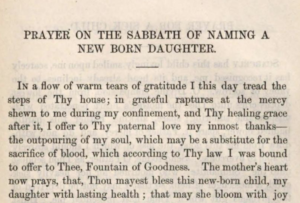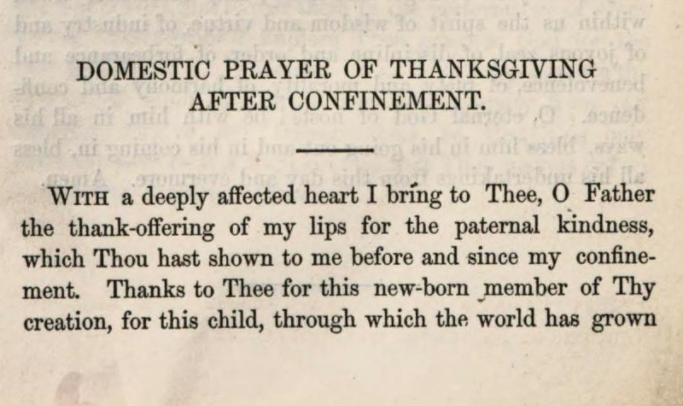| Contribute a translation | Source (English) |
|---|---|
In a flow of warm tears of gratitude I this day tread the steps of Thy house; in grateful raptures at the mercy shewn to me during my confinement, and Thy healing grace after it, I offer to Thy paternal love my inmost thanks— the outpouring of my soul, which may be a substitute for the sacrifice of blood, which according to Thy law I was bound to offer to Thee, Fountain of Goodness. | |
The mother’s heart now prays, that, Thou mayest bless this new-born child, my daughter with lasting health; that may she bloom with joy and delight. | |
And when she shall have outgrown the cradle, then bless her O God with the spirit of light and truth. Grant that she may not harbour in her heart any impure thoughts, any vain desire, any guilty cravings; and that all her powers may be directed to the ennoblement of her mind. | |
May she ever entertain a proper sense of chastity; may she ever be impressed with that feeling of delicacy and propriety so peculiar to our sex. | |
She is yet asleep in calm repose, and is not yet awakened by any tempest of life: therefore ere the flower is developed, ere the soft heart of the child inclines to the alluring strains of evil, bless it, that it may soon acknowledge and love Thee. | |
Eternal grace! do not deprive the mother’s breast of this presented good, preserve it to me unto remote days, and when the redness of sunset on the last evening of my life fades away, may she be my comfort. Amen. |
“Prayer on the Sabbath of Naming a New Born Daughter” by Marcus Heinrich Bresslau was first published in his תחנות בנות ישראל Devotions for the Daughters of Israel (1852), p. 63.
In his preface to Devotions, Bresslau is clear that his prayers in English were adapted from traditional teḥinot that had earlier been published in France, Germany, and Poland. If you know of a specific prayer that may have served as the basis for this one, please leave a comment or contact us.
Source(s)


“Prayer on the Sabbath of Naming a New Born Daughter, by Marcus Heinrich Bresslau (1852)” is shared through the Open Siddur Project with a Creative Commons Public Domain Dedication 1.0 Universal license.










Leave a Reply